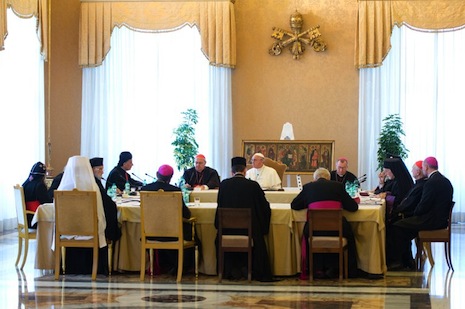Eastern Church leaders discuss self-governing synods with Pope Francis

Picture: AFP Photo/L'Osservatore Romano
- Church leaders of independent Catholic communities from Asia, the Middle East and Eastern Europe have spent the last week in Rome with Pope Francis and Vatican officials discussing the lives of their Church including a subject of high importance to the Pope – the operation of their self-governing synods.
The Vatican says this meeting is an "opportunity" for the patriarchs and archbishops of Eastern Rite communities to present to the pope the situation of their Churches.
However, the November 19-22 meeting may also be another step for Pope Francis in re-shaping the way the Roman Catholic Church operates and decentralizing the Church government, adopting synod-based administrative systems of these churches.
The gathering follows Pope Francis’ suggestion that the universal Church should learn from Eastern and Orthodox Churches’ synodal approach to governance and decision-making when he and the Patriarch of Constantinople (Istanbul) Bartholomew met after he became Pope in March. The Patriarch was the first in 600 years to attend a Papal installation.
The formal purpose of the meeting in Rome this week is to consider "The Eastern Catholic Churches: Fifty years after Vatican II." The meeting is not something Pope Francis inherited. It follows a similar event in 2009, when heads of the Eastern Churches met Pope Benedict for the first time.
Those meeting this week in Vatican include leaders of self-governing Catholic Churches—21 churches that are fully Catholic but operate independently of the Roman Curia in matters of their administration, including selection of their patriarchs, archbishops and bishops.
"Except in matters of faith and morals we are completely free from the Vatican," said Bishop Bosco Puthur, known as the Curia bishop who overseas the Curia of Syro-Malabar Church based in Kerala in southern India.
This independence is restricted to a small population, as all the Oriental Churches together form only 17 million of the more than one billion Catholics globally. Most of these Churches are also numerically small with three major ones—Ukrainian, Syro-Malabar and Maronite—alone accounting for 12.5 million or 80 percent of the Catholic Orientals.
"Each of these Churches, including the Latin Church, has its own genius. The beauty is to learn from each other without destroying the uniqueness of each one," said Bishop Puthur, emphasizing that the eastern syondal administrative system involves every section of the Church.
Bishop Puthur said religious, laity and clergy are directly or indirectly involved in "every decision" of their Church. "The head of the Church, the Major Archbishop, makes no decision on his own. He merely announces the decision of the synod."
The synod of bishops has only bishops as members, "but our bishops have their ears to the ground, they know the pulse of their people and will not support decisions that will go against the interest of the people," the Curia bishop said.
The synod, which came into effect in 1993, elected its Major Archbishop George Alencherry in 2011. "So the system is new. We earlier followed the system of the Latin Church," he said. The election of the head of the Church now needs to be ratified only by the Vatican.
The elections of individual bishops are left to the synod, which periodically sends a list of people who could be elected bishops to synod members. When need arises, the synod elects one from the approved list.
Bishops prepare these lists and make other vital decisions in consultation with lay leaders, religious and laity, according to the Curia bishop. The Church also has Patriarchal Assembly, which has representatives from all sections of a diocese and meets once in five years to discuss issues affecting the community.
'via Blog this'




നമ്മുടെ മെത്രാന്മാര് കേരളസഭ പൗരസ്ത്യസഭയാണെന്ന് അവകാശപ്പെട്ട് മാര്പ്പാപ്പായുമായി ചര്ച്ച നടത്തുന്നുണ്ടെങ്കിലും രണ്ടു വ്യാഴവട്ടത്തിനുമുമ്പ് 1986 ജൂലൈയില് ശ്രീ ജോസഫ് പുലിക്കുന്നേല് ഭാരതസഭയ്ക്ക് ഒരു കാനോന്നിയമം എന്ന ലേഖനത്തില് എഴുതിയിരിക്കുന്ന ഈ ഭാഗത്തിന് ഇന്നും പ്രസക്തിയുണ്ട് എന്ന സത്യം ഇനിയെങ്കിലും നാം മാര്പ്പാപ്പായെ അറിയിക്കേണ്ടിയിരിക്കുന്നു:
ReplyDelete''പേര്ഷ്യാക്കാരുടെയും പോര്ട്ടുഗീസുകാരുടെയും ആഗമനത്തിനു മുമ്പ്, ഭാരതത്തില് ഒരു സഭ ഉണ്ടായിരുന്നു. ഭാരതജനതയുടെ ക്രിസ്ത്വനുഭവത്തിന്റെ ഫലമായിരുന്നു ആ സഭ. പേര്ഷ്യന് സഭയുമായി ഈ ഭാരത സഭ സംസര്ഗ്ഗത്തില് ഏര്പ്പെട്ടിരുന്നെങ്കില്പ്പോലും നൈയാമികമായും പൈതൃകമായും ഈ സഭ പേര്ഷ്യന്സഭയില്നിന്നും വ്യത്യസ്തമായിരുന്നു. ഈ സഭയ്ക്ക് പേര്ഷ്യന് സഭയുമായും പാശ്ചാത്യസഭയുമായും ഉണ്ടായ സംസര്ഗ്ഗംമൂലം വളര്ച്ചയുണ്ടായിട്ടുണ്ട് എന്നത് അഭിമാനകരമാണ്. എന്നാല് ഈ വളര്ച്ച ഭാരതസഭയുടെ ആകമാനവളര്ച്ച എന്നതിനപ്പുറം പേര്ഷ്യന്സഭയുടെയോ പാശ്ചാത്യസഭയുടെയോ വളര്ച്ചയായി കാണുന്നത് തെറ്റായിരിക്കും. ……….ഇന്ന്, ഭാരതത്തില് വിദേശമെത്രാന്മാരില്ല. ഭാരതീയ കത്തോലിക്കരുടെ ശുശ്രൂഷാസേവനരംഗങ്ങള് ഭാരതീയരുടെ കൈകളിലാണ്. അവര് ഭാരതക്രിസ്ത്വനുഭവത്തിന്റെ പങ്കാളികളാണ്; ഒരേ സമൂഹസംസ്കാരത്തിന്റെ ഭാഗങ്ങളാണ്; ഒരേ രാഷ്ട്രനിയമത്തിന് വിധേയരാണ്. ഈ പശ്ചാത്തലത്തില്, ഭാരതത്തിന്റെ സാമൂഹികക്രമമനുസരിച്ച് ഭാരതസഭയ്ക്ക് ആകമാനമുള്ള ഒരു കാനോന്നിയമം നിര്മ്മിക്കേണ്ടത് ആവശ്യമാണ്. പൗരസ്ത്യസഭയുടെ കാനോന്നിയമങ്ങളുടെ ഭാഗമായിട്ടല്ല, പ്രത്യുത ഭാരതവ്യക്തിസഭയുടെ നിയമങ്ങളായി അവ അവതരിക്കപ്പെടണം.
ഭാരതത്തിന് ഒറ്റ ക്രിസ്ത്വനുഭവമേ ഉള്ളൂ; ഭാരതീയ ക്രിസ്ത്വനുഭവം. ഈ ക്രിസ്ത്വനുഭവം കണക്കിലെടുത്തുകൊണ്ട്, ഭാരതത്തിലെ വിശ്വാസികള്ക്കായി ഒരു കാനോന്നിയമം നിര്മ്മിക്കാന് എന്തുകൊണ്ട് നമുക്ക് പരിശ്രമിച്ചുകൂടാ?"